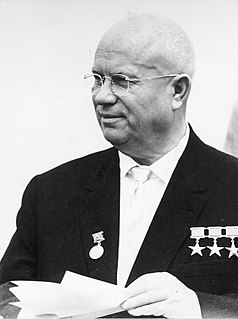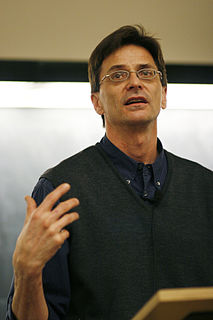A Quote by Nikita Khrushchev
Whether you like it or not, history is on our side. We will bury you!
Related Quotes
I believe that every single human being is entitled to the protection of our laws, whether they can vote or not. Whether they can speak or not. Whether they can hire a lawyer or not. Whether they have a birth certificate or not. And I think future generations will look back at this history of our country and call us barbarians for murdering millions of babies who we never gave them a chance to live.
The question of whether world peace will ever be possible can only be answered by someone familiar with world history. To be familiar with world history means, however, to know human beings as they have been and always will be. There is a vast difference, which most people will never comprehend, between viewing future history as it will be and viewing it as one might like it to be. Peace is a desire, war is a fact; and history has never paid heed to human desires and ideals.
Our generation may stand at a crucial breakpoint in history, for we in the presently affluent nations may be the last who can afford to open up the high frontier. What we do during the next ten or twenty years may determine whether future generations will live in a humane and rewarding society, or whether they will spend their lives in desperate contention for the dwindling sustenance afforded by our limited terrestrial resources.
For today, we celebrate the first glorious anniversary of the Information Purification Directives. We have created, for the first time in all history, a garden of pure ideology. Where each worker may bloom secure from the pests of contradictory and confusing truths. Our Unification of Thought is more powerful a weapon than any fleet or army on earth. We are one people. With one will. One resolve. One cause. Our enemies shall talk themselves to death. And we will bury them with their own confusion. We shall prevail!
The true test of the American ideal is whether we're able to recognize our failings and then rise together to meet the challenges of our time. Whether we allow ourselves to be shaped by events and history, or whether we act to shape them. Whether chance of birth or circumstance decides life's big winners and losers, or whether we build a community where, at the very least, everyone has a chance to work hard, get ahead, and reach their dreams.
Congress passed the 1887 General Allotment Act. And that act ended up dispossessing tribes of 90 million acres. That history of dispossession was also accompanied by a history of forced assimilation whether it was in residential schools, whether it was in dismantling traditional tribal governance structures. And the justifications for that is that you're not as good as us. Our systems are better. Our modes of education. Our ways of owning land, our ways of working have been continually cited to Indians as the reason for these government policies.
History's villains are more easily recognized in retrospect. In an article published in 1935 and reprinted in 1937, Winston Churchill expressed a curious ambivalence towards the German chancellor prior to the outbreak of war: We cannot tell whether Hitler will be the man who will once again let loose upon the world another war in which civilization will irretrievably succumb, or whether he will go down in history as the man who restored honour and peace of mind to the great Germanic nation. . . .







































